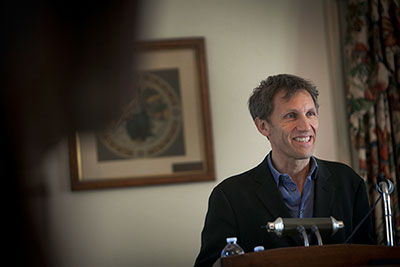How philosophy and music intertwine

French philosopher François Noudelmann took to the piano to demonstrate the intersection of philosophy and amateur music making, the subject of his new book, March 14 in A.D. White House.
Noudelmann, of Paris Diderot University and New York University and author of "The Philosopher's Touch," gave a talk and performed a four-handed Ravel piano piece with his friend Barbara Glissant, followed by a panel discussion about Noudelmann's book.
In his talk, Noudelmann stressed the contrast between the advanced intellectual tastes and interests of three thinkers, Sartre, Nietzsche and Barthes, and their deep devotion, in their daily piano playing, to romantic piano music, such as that of Chopin and Schumann.
Nietzsche was also a prolific composer, and Noudelmann played a recording of a work so closely indebted to Frédéric Chopin that one might almost think in terms of plagiarism. But the relationship between the two, as Noudelmann said, was more complicated. Nietzsche's amateur music playing "cannot be denounced as a mere hobby" or one that is separate from his writings, said Noudelmann. Regarding Sartre -- a political activist who refused to give a lecture at Cornell in protest of the American bombing in North Vietnam -- Noudelmann said the gap between Sartre's public discourse and private pleasure in playing piano had significant meaning. A high modernist in his public tastes, the private Sartre took refuge in bourgeois romanticism and the music of Chopin. And yet, Noudelmann said, Sartre's approach to playing this music as an amateur was idiosyncratic, even distanced.
The professors responding to Noudelmann's talk included Jonathan Culler, the Class of 1916 Professor of English and Comparative Literature; Annette Richards, professor of music; Gail Holst-Warhaft, adjunct professor of classics, comparative literature and Near Eastern studies; and Timothy Campbell, chair of Romance studies and professor of Italian.
In her comments, Richards noted the association, for Sartre and Barthes, of the piano with a female domestic realm. Though in the 19th and early 20th centuries the option of a professional music for women career was out of the question, many women achieved a professional-level degree of accomplishment. For them, "amateurism" at the piano was a very different matter than for the dilettantes Sartre and Barthes, described by Noudelmann.
Culler commented that in his book Noudelmann repeatedly speaks of Sartre and Barthes as "sight-reading" the music they played, but that neither of them is attempting to play new pieces; rather, both are repeatedly playing pieces they loved. Why the stress on "sight-reading?" Noudelman responded that for him, the distinction is between just playing the piece from a score (which he calls "sight-reading") and practicing it, going over the difficult bits, to try to get it right, as a performer would.
The panelists also discussed the "guilty pleasure of melody" that philosopher-pianists often encounter, which Noudelmann addressed in his book. Both Nietzsche and Sartre enjoyed Chopin even though they didn't believe that's what humanity should be spending its time on, he said.
The event was sponsored by the Department of Romance Studies, the Department of Music and the Society for the Humanities.
Julian Montijo '15, a writer intern for the Cornell Chronicle, contributed to this story.
Media Contact
Get Cornell news delivered right to your inbox.
Subscribe